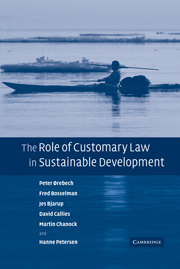Book contents
- Frontmatter
- Contents
- Preface
- Acknowledgements
- Table of cases
- List of international conventions
- Introduction
- 1 The linkage between sustainable development and customary law
- 2 Three case studies from Hawaii, Norway and Greenland
- 3 Social interaction: the foundation of customary law
- 4 How custom becomes law in England
- 5 How custom becomes law in Norway
- 6 Adaptive resource management through customary law
- 7 The place of customary law in democratic societies
- 8 Customary law, sustainable development and the failing state
- 9 Towards sustainability: the basis in international law
- 10 The case studies revisited
- 11 The choice of customary law
- 12 Conclusion: customary law in a globalizing culture
- References
- Index
- Authors index
7 - The place of customary law in democratic societies
Published online by Cambridge University Press: 18 December 2009
- Frontmatter
- Contents
- Preface
- Acknowledgements
- Table of cases
- List of international conventions
- Introduction
- 1 The linkage between sustainable development and customary law
- 2 Three case studies from Hawaii, Norway and Greenland
- 3 Social interaction: the foundation of customary law
- 4 How custom becomes law in England
- 5 How custom becomes law in Norway
- 6 Adaptive resource management through customary law
- 7 The place of customary law in democratic societies
- 8 Customary law, sustainable development and the failing state
- 9 Towards sustainability: the basis in international law
- 10 The case studies revisited
- 11 The choice of customary law
- 12 Conclusion: customary law in a globalizing culture
- References
- Index
- Authors index
Summary
Introduction
By means of the idea of rights men have defined the nature of license and tyranny. Guided by its light, we can each of us be independent without arrogance and obedient without servility.
Alexis de TocquevilleThe necessary notification, visibility, vital firmness of mind, unity and harmony are built into the basic customary law instrument through pluralistic recognition and adherence. Customary law-making – as an instrument to command voluntary obedience – is neither inimical to democratic thinking nor immature in relation to systems of parliamentary democracy. As Frederick A. Pollock said, the “only essential conditions for the existence of law are the existence of a political community, and the recognition by its members of settled rules binding upon them in that capacity.”
Alexis de Tocqueville defended areas of rights that belonged entirely to the “popular will” and that no parliament could overrule. The French historian Paul Janet makes this evident:
What the Liberal school called the despotism of democracy was demagogic violence, the brutal and savage government of the masses. But de Tocqueville had in mind another kind of despotism, not that of militant democracy … No, he envisaged democracy at rest, successively leveling down and abasing all individuals, putting its fingers into all kinds of interests, imposing uniform and petty rules on every one, treating men as abstractions, subjecting society to a mechanical movement, and ending by responding itself in the absolute power of one man.
- Type
- Chapter
- Information
- The Role of Customary Law in Sustainable Development , pp. 282 - 337Publisher: Cambridge University PressPrint publication year: 2006
- 2
- Cited by



